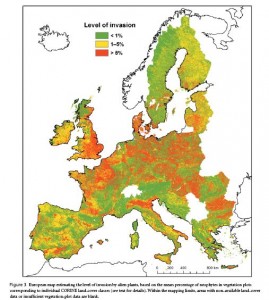- Wild cotton use lands prize for boffin trio.
- Unesco to protect wild Citrus in India. And read the discussion.
- IV International Symposium on Fig.
- Permaculture: The Podcast.
- The NY Times thinks Americans should eat fewer turtles. And drink more South African wine.
- Meanwile, the WSJ gets into single-source chocolate.
- Nice map of freshwater fish diversity. But will it last? WWF has a plan.
Europe invaded by aliens
The journal Diversity and Distribution has a paper on the distribution of alien plants in Europe. You need a subscription for that, but the paper also appears to be online here, on the website of one of the authors. Here’s the map (click to enlarge it):

Could this be used to estimate the level of threat faced by some crop wild relatives?
Domestication trifecta
We’ve blogged a number of times about the paradigm shift that’s occurring among students of plant domestication, driven by increasing interaction and synergy between archaeologists and geneticists. The idea of “rapid, localised” domestication is down if not out: all the talk these days is of domestication as a protracted, multi-locational and biologically complex process.
Well, there’s a very nice review of the history of this shift in Trends in Ecology and Evolution, at least as it concerns the crops domesticated in the Fertile Crescent. It is only very recently that geneticists have looked at their molecular data in the light of archaeological results and realized that there were other ways to interpret them apart from the conventional idea of domestication in one place over the course of a few human generations.
Meanwhile, a paper in Annals of Botany looks at another source of data, i.e. written sources. Chinese investigators have looked at references to eggplants in ancient encyclopedias, concordances and even poetry, and charted changes in size, shape and taste over the past 2000 years. The oldest reference dates back to 59 BC, and since then the Chinese eggplant has gone from round to a variety of shapes, has increased dramatically in size, and has become much sweeter.
Finally, our friend Hannes Dempewolf and co-authors have a paper in GRACE which looks in detail at domestication in the Compositae. Why have only a handful of species in this family been fully domesticated? Secondary defence compounds, inulin as a storage product and wind dispersal, the authors suggest.
El hombre de la papa
Here is a video about the life and work of Carlos Ochoa, the recently deceased potato man. By the Televisión Nacional del Perú, in Spanish. From his early days in Cusco, resisting a father that wanted him to become a lawyer, to the agony of an approaching end, with so much of his life’s work unfinished. Watch, listen, admire, and shiver.
Ex situ conservation of endangered plants of the US
An interesting post on the Denver Botanic Garden’s blog led me to the Center for Plant Conservation‘s ((Hosted by the Missouri Botanical Garden in St. Louis, Missouri.)) database of the National Collection of Endangered Plants of the US, which I’m ashamed to say I knew nothing about. It is interesting to us here because it includes crop wild relatives like Helianthus species. There’s also lots of information on how to fight invasives, which has been the subject of some discussion here in the past few days.